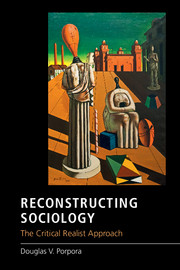Book contents
- Frontmatter
- Dedication
- Contents
- Acknowledgments
- 1 Seven myths of American sociology
- 2 Do realists run regressions?
- 3 What is truth?
- 4 Whatever happened to social structure?
- 5 Are we not men – or, rather, persons?
- 6 What and where is culture?
- 7 Do we need critical realism?
- 8 So what do we do with it?
- Bibliography
- Index
2 - Do realists run regressions?
Published online by Cambridge University Press: 05 April 2016
- Frontmatter
- Dedication
- Contents
- Acknowledgments
- 1 Seven myths of American sociology
- 2 Do realists run regressions?
- 3 What is truth?
- 4 Whatever happened to social structure?
- 5 Are we not men – or, rather, persons?
- 6 What and where is culture?
- 7 Do we need critical realism?
- 8 So what do we do with it?
- Bibliography
- Index
Summary
The question posed by the title of this chapter has already been answered briefly in the introduction. Yes, critical realists do run regressions – and other analytical statistics – but not with the same understanding or point as positivists. The reason is that CR has a completely different understanding of causality and causal explanation. In this chapter we will take things slowly. We will begin by seeing why the positivist understanding of causality is completely untenable and why, if we replace it, there is no reason to deny causality in the human sphere as do the post-Wittgensteinians and their interpretivist followers in sociology.
The CR conception of sociology is associated with mechanisms and with emergence. In this book, I will speak sparingly of emergence. Although I believe in emergence and, as we will soon see, it is sometimes key, we can understand much of CR without raising the complications associated with it.
Mechanisms, on the other hand, are central. As Philip Gorski observes, mechanisms are now trendy, increasingly spoken of also by Symbolic Interactionists, historical sociologists, and rational choice theorists. Thus, one thing we will need to do is differentiate the CR conception from these others. Doing so will to some extent anticipate our discussion in Chapter 4, because the differences also involve differences in the ways we think of structure and agency.
Mechanisms, however, do not exhaust the CR approach to causality or its implications for plurality in research methods. According to CR, causal analysis proceeds at three different levels. First is the identification and description of causal mechanisms and causal powers; second is the invocation of those causal mechanisms and causal powers in narrative accounts of contingent, causal conjunctures. Narrative, not regression equations, is, according to CR, the canonical form of causal explanation – not just in the social sciences but in all open systems, including physics.
The final level at which causal analysis proceeds is the methodological adjudication among rival explanations and narratives. Just because we offer an explanation or narrative does not mean it is the right one. There may be better explanations or narratives. At this level, recapturing a fractured unity, CR embraces methodological pluralism.
Information
- Type
- Chapter
- Information
- Reconstructing SociologyThe Critical Realist Approach, pp. 31 - 64Publisher: Cambridge University PressPrint publication year: 2015
Accessibility standard: Unknown
- 3
- Cited by
